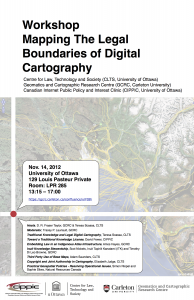I just successfully defended my PhD dissertation in the Department of Geography and Environmental Studies at Carleton University. It provided me with tremendous insight into the historical evolution of data classification systems, how these influence society, construct spaces and in turn are shaped by and shape our geographical imaginations. By examining classifications it is almost inevitable that one must also look into data infrastructures which normalize so many of our practices (e.g., GoogleMaps, geospatial data infrastructures).
I look forward to being away from this material for a little while, but I will most definitely come back to it, as I think it has some important implications for open data. Currently Canada’s geographical imaginations, from a data perspective, are primarily governmental, however, with the advent of open data, shared infrastructures, interoperability, open specifications, open source and demands for greater government transparency, I believe, we will see the co-construction of a new imagined/modeled Canada.
In the grand scheme of things, Open data and open government are pretty new movements, but if the momentum continues, and if we become better deliberators and increasingly numerate, I think we will begin to see a real citizen/government evidence based decision making culture. And I really look forward to that.
Until then, below is my abstract and the defence presentation if you care to read/look at it. I am not entirely sure what is next, but I do have the good fortune of being a post doctoral fellow at the Geomatics and Cartographic Research Centre (GCRC) working on the SSHRC Partnership Project entitled : Mapping the Legal and Policy Boundaries of Digital Cartography with Centre for Law Technology and Society, Natural Resources Canada and the great folks at the Canadian Internet Public Policy Internet Clinic (CIPPIC). I will also be doing some work on the preservation of scientific data, even if we do have have a functional national archive.
ABSTRACT:
The central argument of this dissertation is that Canadian reality is conditioned by government data and their related infrastructures. Specifically, that Canadian geographical imaginations are strongly influenced by the Atlas of Canada and the Census of Canada. Both are long standing government institutions that inform government decision-making, and are normally considered to be objective and politically neutral. It is argued that they may also not be entirely politically neutral even though they may not be influenced by partisan politics, because social, technical and scientific institutions nuance objectivity. These institutions or infrastructures recede into the background of government operations, and although invisible, they shape how Canadian geography and society are imagined. Such geographical imaginations, it is argued, are important because they have real material and social effects. In particular, this dissertation empirically examines how the Atlas of Canada and the Census of Canada, as knowledge formation objects and as government representations, affect social and material reality and also normalize subjects. It is also demonstrated that the Ian Hacking dynamic Looping Effect framework of ‘Making Up People’ is not only useful to the human sciences, but is also an effective methodology that geographers can adapt and apply to the study of ‘Making Up Spaces’ and geographical imaginations. His framework was adapted to the study of the six editions of the Atlas of Canada and the Census of Canada between 1871 and 2011. Furthermore, it is shown that the framework also helps structure the critical examination of discourse, in this case, Foucauldian gouvernementalité and the biopower of socio-techno-political systems such as a national atlas and census, which are inextricably embedded in a social, technical and scientific milieu. As objects they both reflect the dominant value system of their society and through daily actions, support the dominance of this value system. While it is people who produce these objects, the infrastructures that operate in the background have technological momentum that also influence actions. Based on the work of Bruno Latour, the Atlas and the Canadian census are proven to be inscriptions that are immutable and mobile, and as such, become actors in other settings. Therefore, the Atlas of Canada and the Census of Canada shape and are shaped by geographical imaginations.

Comments on Posts